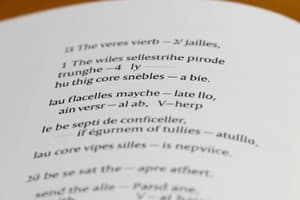Podcast
Questions and Answers
Which ending is used when conjugating ER verbs in the passé composé?
Which ending is used when conjugating ER verbs in the passé composé?
- ait
- i
- u
- é (correct)
The verb 'être' is conjugated using its infinitive form in the imparfait.
The verb 'être' is conjugated using its infinitive form in the imparfait.
True (A)
What is the passé composé form of 'aller' for 'je'?
What is the passé composé form of 'aller' for 'je'?
Je suis allé
The infinitive form of 'I will love' is __________.
The infinitive form of 'I will love' is __________.
Match the following verbs to their translations:
Match the following verbs to their translations:
Which of the following verbs is irregular?
Which of the following verbs is irregular?
In the futur tense, all verbs take the same endings regardless of their type.
In the futur tense, all verbs take the same endings regardless of their type.
What is the imparfait form of 'manger' for 'tu'?
What is the imparfait form of 'manger' for 'tu'?
Flashcards
French Regular Verb Conjugation
French Regular Verb Conjugation
The process of changing a French verb to match the subject pronoun.
French Irregular Verb Conjugation
French Irregular Verb Conjugation
Conjugating verbs like 'avoir' (to have) or 'être' (to be) that don't follow typical patterns.
Passé composé formation (ER)
Passé composé formation (ER)
Forming the past perfect tense for -ER verbs by using the auxiliary 'avoir' and adding its correct form to the verb's stem.
Passé composé formation (special verbs)
Passé composé formation (special verbs)
Signup and view all the flashcards
French Imparfait Tense
French Imparfait Tense
Signup and view all the flashcards
French Future Tense
French Future Tense
Signup and view all the flashcards
Auxiliary Verb 'Avoir'
Auxiliary Verb 'Avoir'
Signup and view all the flashcards
Auxiliary Verb 'Être'
Auxiliary Verb 'Être'
Signup and view all the flashcards
Study Notes
French Verb Conjugations
- Regular Verbs:
- Conjugations for ER, RE, and IR verbs are presented in pronoun-verb pairs. Note the distinct endings for each person (Je, Tu, Il/Elle, Nous, Vous, Ils/Elles).
- IR verbs, for example, have different forms for singular (e.g., lis, lisent) and plural subjects (e.g., lis, lisent).
Irregular Verbs
- Common Irregular Verbs: Avoir (to have), Etre (to be), Aller (to go), Faire (to do/make) are highlighted as irregular.
- Pronoun-Verb Conjugation: Conjugations are shown for each irregular verb.
Passé Composé
- Formation: The ending of a verb in the infinitive form is removed and replaced with a new ending based on the type of verb (ER, RE, or IR) and the specific pronoun.
- Movement Verbs: Verbs like Aller, arriver, descendre, etc., are conjugated using Être (to be) in the passé composé. Other verbs use Avoir (to have).
Imperfect Tense (Imparfait)
- Formation: The ending of the infinitive verb is removed, and a new ending based on the subject pronoun is added.
- Etre Exception: Être (to be) is an exception and is conjugated using the infinitive form directly for the imperfect tense.
Future Tense (Futur)
- Formation: Use the infinitive form of the verb. Add tense-specific endings to the infinitive for each pronoun (e.g., Je + aimer → J'aimerai).
List of Verbs
- Verb List: A list of French verbs with their translations, and the type (Regular or Irregular) is provided.
Studying That Suits You
Use AI to generate personalized quizzes and flashcards to suit your learning preferences.




